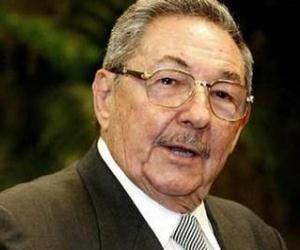Cuban President Raul Castro meets U.S. delegation
- Submitted by: lena campos
- Business and Economy
- 05 / 30 / 2014

"We talked about steps forward that might be taken by both countries" to improve U.S.-Cuba relations, Thomas Donohue, the head of the U.S. Chamber of Commerce, said as the delegation prepared to board a private plane back to the U.S. at the end of its three-day visit.
"It was positive and we expect to talk again," Donohue said on meeting Castro.
The 12-person delegation included executives from Cargill, one of the world's largest suppliers of agricultural products and foods, and Amway, the direct-selling mega-corporation.
Most trade between Cuba and the U.S. is outlawed by the latter's 52-year trade embargo on the island.
The delegation met owners of small businesses in Cuba and toured a state auto repair shop that has been turned into a private cooperative.
Donohue spoke to students and government officials Thursday about the power of free markets at the University of Havana, where Fidel Castro studied law before embarking on the path to revolution.
"Those of us who oppose the embargo are often accused of excusing or ignoring the Cuban government's record on human rights and personal freedom," Donohue told the crowd. "In fact they need to be addressed by our governments in a constructive and ongoing dialogue."
Donohue praised Cuban government efforts to attract more international investment and allow more of its citizens to work for themselves but said the island had to go further with its economic reforms.
"We deeply believe that countries with strong private sectors, free of excessive government control and ownership, will have the most successful and productive economies."
Under reforms initiated by Raul Castro, nearly 500,000 Cubans have started their own businesses, activity that was strictly forbidden for much of the Cuban revolution.
In March, Cuba's National Assembly passed a new foreign investment law that aims to attract billions of dollars in international financing.
Despite the changes slowly unfolding in the Cuban economy, it remains unclear if there will be any significant alteration to the current stalemate in Cuba-U.S. relations.
Although President Barack Obama allowed Cuban-Americans to make unlimited visits to the island and lifted the cap on remittances they could send to relatives, the improving relationship between the two countries was overshadowed by the arrest of U.S. State Department contractor Alan Gross in 2009.
Gross is serving a 15-year sentence in Cuba for importing illegal satellite communications equipment to the island as part of what Cuban officials have called a plot to foment dissent.
Cuban officials have said they wish to discuss Gross' case along with those of three Cuban intelligence officers imprisoned in the U.S. But so far, U,S, officials have said relations will not improve between the two countries until Gross is released.
Despite the challenges, Donohue said the President struck an optimistic note about the future of the two nations' relations.
Source: CNN.com
Comments